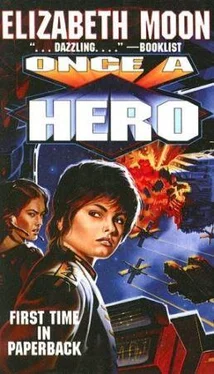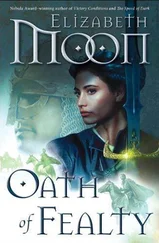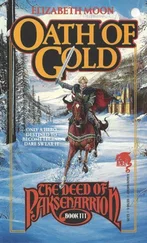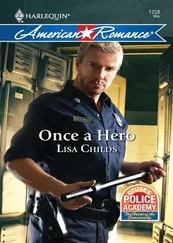Elizabeth Moon - Once a Hero
Здесь есть возможность читать онлайн «Elizabeth Moon - Once a Hero» весь текст электронной книги совершенно бесплатно (целиком полную версию без сокращений). В некоторых случаях можно слушать аудио, скачать через торрент в формате fb2 и присутствует краткое содержание. Жанр: Космическая фантастика, Боевая фантастика, на английском языке. Описание произведения, (предисловие) а так же отзывы посетителей доступны на портале библиотеки ЛибКат.
- Название:Once a Hero
- Автор:
- Жанр:
- Год:неизвестен
- ISBN:нет данных
- Рейтинг книги:3 / 5. Голосов: 1
-
Избранное:Добавить в избранное
- Отзывы:
-
Ваша оценка:
- 60
- 1
- 2
- 3
- 4
- 5
Once a Hero: краткое содержание, описание и аннотация
Предлагаем к чтению аннотацию, описание, краткое содержание или предисловие (зависит от того, что написал сам автор книги «Once a Hero»). Если вы не нашли необходимую информацию о книге — напишите в комментариях, мы постараемся отыскать её.
Once a Hero — читать онлайн бесплатно полную книгу (весь текст) целиком
Ниже представлен текст книги, разбитый по страницам. Система сохранения места последней прочитанной страницы, позволяет с удобством читать онлайн бесплатно книгу «Once a Hero», без необходимости каждый раз заново искать на чём Вы остановились. Поставьте закладку, и сможете в любой момент перейти на страницу, на которой закончили чтение.
Интервал:
Закладка:
“In the long run,” Esmay said. “Strategy, cousin.”
“Oh.” Luci halted the mare, and sat silently a moment, obviously wondering how much to tell her older cousin. Is she safe was written on her face as if with a marker.
“I have a reason for asking,” Esmay said.
“Well . . . I was going to try for the vet course at the Poly, though Mother wants me to study ‘something more appropriate’ at the University. I know there’s no chance of getting on the estate staff here, but if I qualified, I might somewhere else.”
“I suspected as much.” Esmay meant it benignly, but Luci flared up.
“I’m not just dreaming—”
“I know that. Get the hump out of your back. You’re serious, just as I was serious . . . and nobody believed me, either. That’s why I had the idea—”
“What idea?”
Esmay nudged her horse, and it ambled over to Luci’s mare. The mare twitched her ears but otherwise stood still. Esmay lowered her voice. “As you know, my father gave me a herd. The last thing I need is a herd, but if I try to give it back, he’ll be hurt and I’ll hear about it forever.”
Luci’s face relaxed; she almost grinned. “So?”
“So I need someone to manage my herd. Someone who will make sure that the mares go to the right stallions . . . that the foals get the right training, and are actually put on the market—” Family horses almost never went to market. “—And so forth,” Esmay said. “I would expect to compensate the manager, of course. The eye of the master fattens the herd . . . and I will be far away, for a very long time.”
“You’re thinking of me?” Luci breathed. “It’s too much—the mare, and—”
“I like the way you handle her,” Esmay said. “It’s how I’d want my horses handled, if I wanted horses at all . . . and since I have them, that’s what I’d like. You could save up the money for school—I know from experience that it impresses them if you fund your own escape. And you’d get the experience.”
“I’ll do it,” Luci said, grinning. Despite herself, Esmay thought back to the previous night’s conversation. Here was someone for whom prudence could never swamp enthusiasm.
“You didn’t ask what I’m paying,” Esmay said. “You should always find that out first . . . what it’s going to cost, and what you’re going to get.”
“It doesn’t matter,” Luci said. “It’s the chance—”
“It matters,” Esmay said, and surprised herself with the harshness of her voice; the horse under her shifted uneasily. “Chances aren’t what they seem.” Then, at the look on Luci’s face, she stopped herself. Why was she being negative, when she had just been admiring Luci’s impetuosity? “Sorry. Here’s what I want from you—a fair accounting of costs and income. Midsummer—that should give you time to write it up after the foal crop arrives.”
“But how much—” Now Luci looked worried.
“You didn’t ask before. I’ll decide later. Maybe tomorrow.” Esmay nudged her mount, and started off toward the distant line of trees beyond the canter track; her cousin followed.
She had forgotten about the old man at the reception until a servant announced him after lunch, when she had lingered in the kitchen over a second piece of rednut pie smothered in real cream.
“Retired soldier Sebastian Coron, dama, requests a few moments of your time.”
Seb Coron . . . of course she would see him. She wiped the last of the pie from her mouth, and went out to the hall, where he stood at ease, watching one of the younger cousins practice the piano with Sanni standing by, counting the time.
“Reminds me of you, Esmay,” he said when she came forward to shake his hand.
“It reminds me of hours of misery,” Esmay said, smiling. “The untalented and unrhythmic should never be forced to go beyond learning a few scales . . . once we’ve admitted how hard it is, we should be let off.”
“Well, you know, it’s in the old law.” It was, though Esmay had never understood why every child, with or without ability or interest, should be forced through ten years of musical training on a minimum of four instruments. They didn’t make all children learn soldiering.
“Come on in the sitting room,” Esmay said, leading him to the front room where women of the family usually received guests. Her stepmother had redone it again, but the bright floral-patterned covers on the chairs and long padded benches were in a traditional print. This one had more orange and yellow, and less red and pink, than Esmay remembered. “Would you like tea? Or something to drink?” Without waiting for an answer, she rang; she knew that with his arrival the kitchen staff would have started preparing the tray with his favorites, whatever they were.
She settled him in one of the wide low chairs, with the tray at his side, and herself chose a seat to his left, the heart-side, to show her awareness of the family bond.
Old Sebastian twinkled at her. “You have done us proud,” he said. “And it’s all over for you, the bad times, eh?”
Esmay blinked. How could he think that, when she was still in Fleet? She had to expect other combat in the future; surely he realized that. Perhaps he meant the recent trouble.
“I certainly hope I never have to go through a court-martial again,” she said. “Or the mutiny that led to it.”
“You did well, though. That’s not exactly what I meant, though I’m sure it was unpleasant enough. But no more old nightmares?”
Esmay stiffened. How did he know about her nightmares? Had her father confided to this man? She certainly wasn’t about to tell him about them. “I’m doing all right,” she said.
“Good,” he said. He picked up his glass, and sipped. “Ah, this is good. You know, even when I was still active, your father never stinted the good stuff when I came here. Of course, we both understood it was special, not something to be talked about.”
“What?” Esmay said, without much curiosity.
“Your father, he didn’t want me to talk about it, and I could see his point. You’d had that fever, and nearly died. He wasn’t sure what you remembered, and what was the fever dreams.”
Esmay fought her body to stillness. She wanted to shiver; she wanted to gag; she wanted to run away. She had done all those, in past times, without success. “It was the dreams,” she said. “Just the fever, they said, something I’d caught when I ran away.” She managed a dry laugh. “I can’t even remember where I thought I was going, let alone where I got to.” She did remember a nightmare train ride, fragments of something else she tried not to think about.
She did not know what tiny movement—a flicker of eyelid, a tension in the muscles along his jaw—but she knew at once that he knew something. Knew something that she did not, which he longed to convey and felt he must conceal. Her scalp prickled. Did she want to know, and if she did, could she get him to tell her?
“Well, you went to find your father . . . that was simple. Your mother had died, and you wanted him, and he was right there in the midst of a nasty little territorial dispute. That was when the Borlist branch of the Old Believers had decided to pull out of the regional planning web, and take over the upper rift valley.”
Esmay knew about that miscalled dispute: the Califer Uprising had been a civil war, small but intense.
“No one realized you could read that well, let alone that you could read a map . . . you hopped on your pony, with a week’s food, and set off—”
“On a pony ?” She could hardly imagine that; she had never liked riding that much. She’d have expected her young self to sneak a ride on a truck bound for town.
Читать дальшеИнтервал:
Закладка:
Похожие книги на «Once a Hero»
Представляем Вашему вниманию похожие книги на «Once a Hero» списком для выбора. Мы отобрали схожую по названию и смыслу литературу в надежде предоставить читателям больше вариантов отыскать новые, интересные, ещё непрочитанные произведения.
Обсуждение, отзывы о книге «Once a Hero» и просто собственные мнения читателей. Оставьте ваши комментарии, напишите, что Вы думаете о произведении, его смысле или главных героях. Укажите что конкретно понравилось, а что нет, и почему Вы так считаете.












